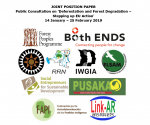La nota conceptual para las evaluaciones pilotas de Whakatane ha sido concluido. Se puede descargar aquiTal y como se mencionó en el boletín electrónico del FPP de febrero pasado, se llevó a cabo una reunión en la Conferencia de “Compartir el poder” de la UICN CPAES realizada en Whakatane, Nueva Zelandia en enero 2011, entre los representantes indígenas, los presidentes de las tres comisiones de la UICN (CPAES,CMAP y CSE) y las sub-comisiones TILCEPA (por sus siglas en inglés) y TGER (por sus siglas en inglés), además de personal clave de la secretaría de la UICN (el Director del Programa del Medio Ambiente y Desarrollo, y el Asesor Sénior en Políticas Sociales), y otros funcionarios de la UICN, de la ONG Conservación Internacional y del FPP. El resultado principal de dicha reunión y de las discusiones de seguimiento posteriores, fue un acuerdo para implementar una serie de medidas con el fin de evaluar la implementación de las resoluciones relacionadas con los pueblos indígenas, adoptadas en el 4° Congreso Mundial de la Naturaleza de la UICN (WCC4) en 2008. De esta manera se pueden identificar vacíos entre los compromisos y la práctica para ayudar a avanzar la implementación de las resoluciones.












